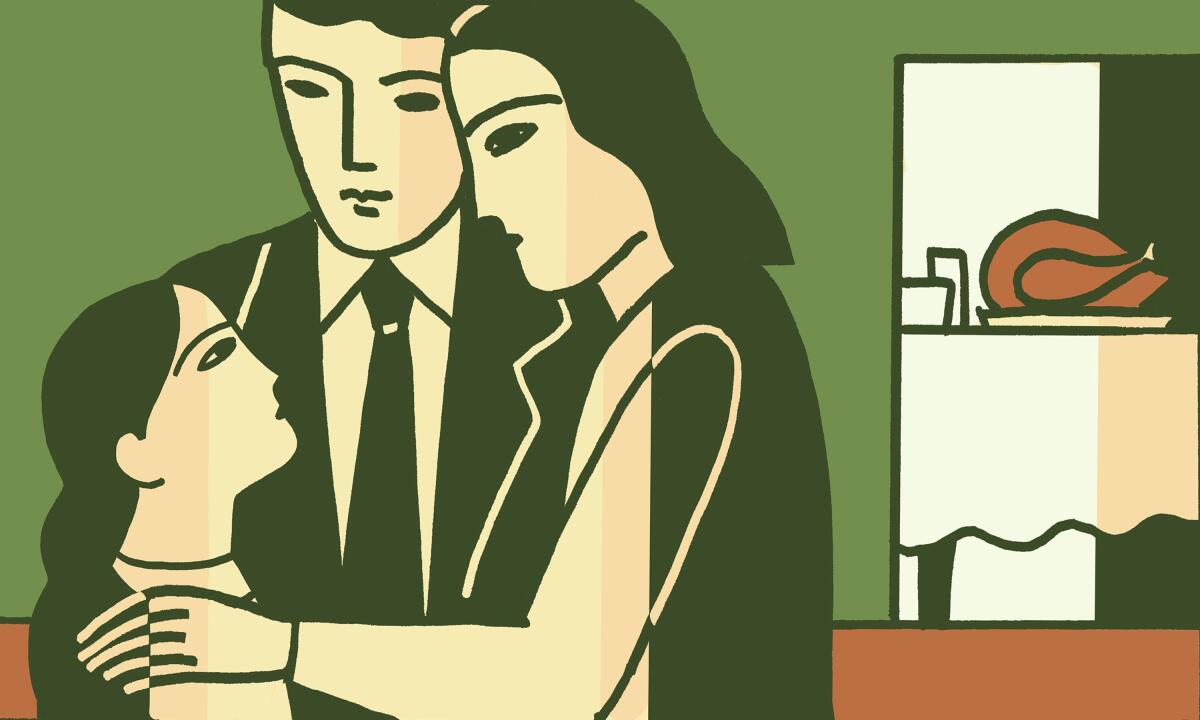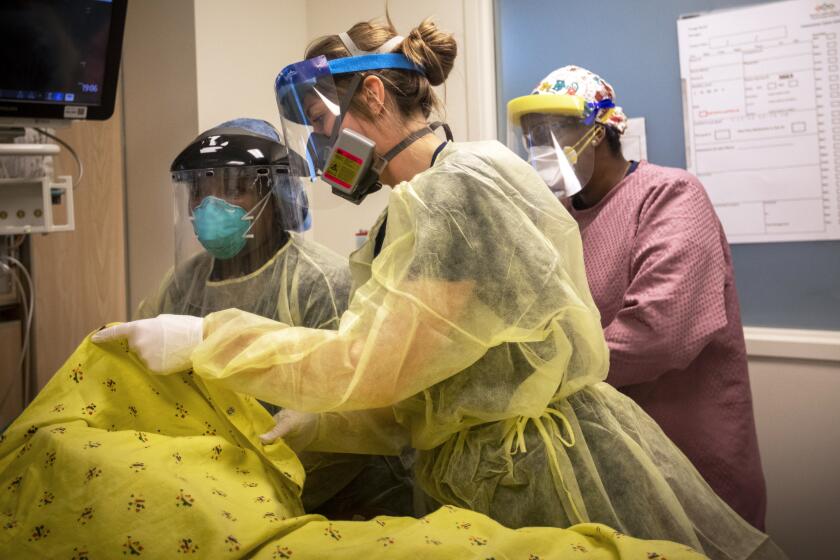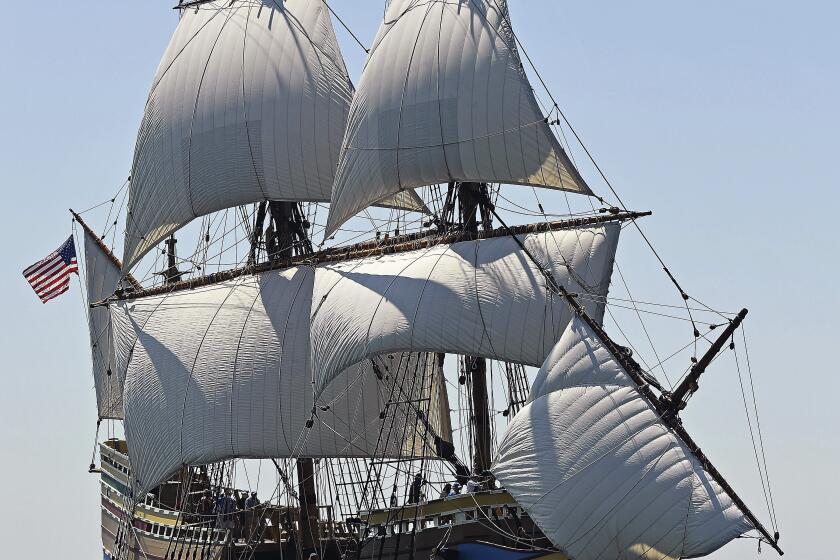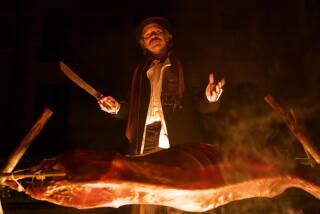Column: What you don’t know about the first Thanksgiving might keep you home for this one

To mark the 400th anniversary of one of the world’s most famous voyages, the Mayflower Memorial in Southhampton, England, installed a new plaque this month. Situated alongside those honoring the Mayflower’s passengers and crew, it reads: “In memory of the Wampanoag of Patuxet who perished in the ‘Great Dying’ plague of 1616 to 1619 introduced by European and English invaders. The decimated village of Patuxet — a graveyard — was settled by the pilgrims who arrived on the Mayflower in 1620. They renamed the village Plymouth Colony.”
Now, I don’t want to ruin anyone’s Thanksgiving or anything, but I honestly don’t know what to do with the fact that, despite a rising tide of COVID-19 infections and deaths, health officials are having to plead with Americans to not celebrate this holiday in a manner that will, without question, endanger themselves and millions of others.
Especially when it’s a holiday that is specifically and deeply rooted in the devastating impact of deadly disease.
We all know that half of the Pilgrims did not survive the first winter after their March landing at Plymouth Rock. But a big reason the other half made it was their ability to move right into a ready-made village — complete with structures, fields, nearby stream, and buried grain and beans — that had recently been emptied by a pandemic. Or, as King James I put it, writing as only a racist despot can: “a wonderful plague … so as there is not left any that do claim or challenge any kind of interest therein.”
Originating with earlier European explorers, a disease that scientists now believe was leptospirosis had come to the New World via rat urine (the rats, they have a lot to answer for) and wiped out thousands of Native Americans, including all of the Patuxet community and more than two-thirds of the Wampanoag nation.
This may be why the Pilgrims were allowed to land at Plymouth Rock in the first place — most of the Wampanoag were dead and the rest were not necessarily keen to go near the type of people they by then associated with disease.
What you do — how we ALL act in the next six weeks — will make the difference between an inconvenient fall and a disaster that will take years to overcome.
Also, Tisquantum, or Squanto, had recently rejoined his tribe after being forced to spend several years in England.
As luck and imperialism would have it, Tisquantum was one of the last Patuxet; he survived the Great Dying only because — surprise! — he had been kidnapped and enslaved in 1614 by one Thomas Hunt (an associate of Capt. John Smith; Smith, with whom Tisquantum had originally worked as a guide, was not pleased when he heard). First taken to Spain to be sold, Tisquantum escaped and fled to England, where he improved his English and was subsequently hired as an interpreter for the Newfoundland Co.
Five years after his abduction, Tisquantum made his way back to New England only to find that all of his people were dead and English settlers were about to move into their village.
Where the remains of Patuxet‘s people still, well, remained. The Pilgrims moved into a village filled with skeletons. Pass the sweet potatoes.
I realize the Pilgrims were brave by the standards of their own white European, xenophobic, colonizing, religious-freedom-via-genocide time and place — but honestly most of the thanks in Thanksgiving should go to Tisquantum. Instead of inciting violence, exacting revenge or, at the very least, insisting these Mayflower interlopers get back on the boat and off his lawn, he opened peaceful negotiations between the Plymouth Colony and the Wampanoag federation.
Now Tisquantum was no saint and he subsequently got into some trouble by leveraging his bilingual abilities to play both sides (honestly, can you blame him?). But he is, in many ways, the founder of the 1621 meal that would inspire the holiday so many of us cannot imagine celebrating in any way other than commingling a bunch of households while in the midst of a pandemic.
Our plague year is an opportunity to see, at last, one of the hidden truths of America’s founding: the great suffering of the Native people.
And in case you were wondering — which you should be because it is an important point — Tisquantum died the very next year, most probably of the same disease that had killed the rest of the Patuxet. Because, you know, no vaccines in 1622.
So we currently have many Americans arguing — basically in Tisquantum’s honor, though most don’t know it — that they should be able to celebrate a holiday whose inception was bookended by a historic plague. To celebrate it, that is, in such a way as to accelerate a current pandemic.
Honestly, where is King James I when you need him?
I like eating turkey and pie with friends and relations as much as the next person, but I will not be doing so this year because, my fellow Americans, this is a no-brainer. The first Thanksgiving was a celebration of survival. The people who gathered for that meal had lost friends and loved ones en masse, had been forced to live in ways that were difficult and sometimes only marginally successful, and had found themselves relying on people about whom they harbored many misconceptions and much mistrust.
If we are going to share in their gratitude, could we please do it in a way that does not fly in the face of all the hardship they had to endure?
Do you think any member of the Wampanoag or the Plymouth Colony would insist on some big feast if they knew it would result in more illness, more deaths? They lost children and parents and spouses and friends to diseases they could not even name, diseases that we can prevent with an inoculation or cure with pill. Imagine what they would have given for the knowledge we possess; imagine how horrified they would be at the notion of the country they helped found simply ignoring that knowledge because its citizens were tired of watching Netflix, of not being able to travel or have parties.
Because we just want to have a “traditional” Thanksgiving (which didn’t become a national holiday until 1860, by the way), even though that one celebration could sicken our loved ones, fill our hospitals, kill us by the thousands.
Like I said, I don’t want to ruin anyone’s Thanksgiving, but I would rather that none of us wind up on some Thanksgiving 2020 plaque engraved by whoever shoves our skeletons aside and moves into whatever world we have left behind because we chose to eat a bunch of turkey in a way that made everyone’s year much, much worse.
There will be plenty of time to celebrate but, like the Wampanoag and the Pilgrims, first we all have to survive the plague. And a winter that will be just as long and dark as we help make it.
More to Read
The biggest entertainment stories
Get our big stories about Hollywood, film, television, music, arts, culture and more right in your inbox as soon as they publish.
You may occasionally receive promotional content from the Los Angeles Times.













